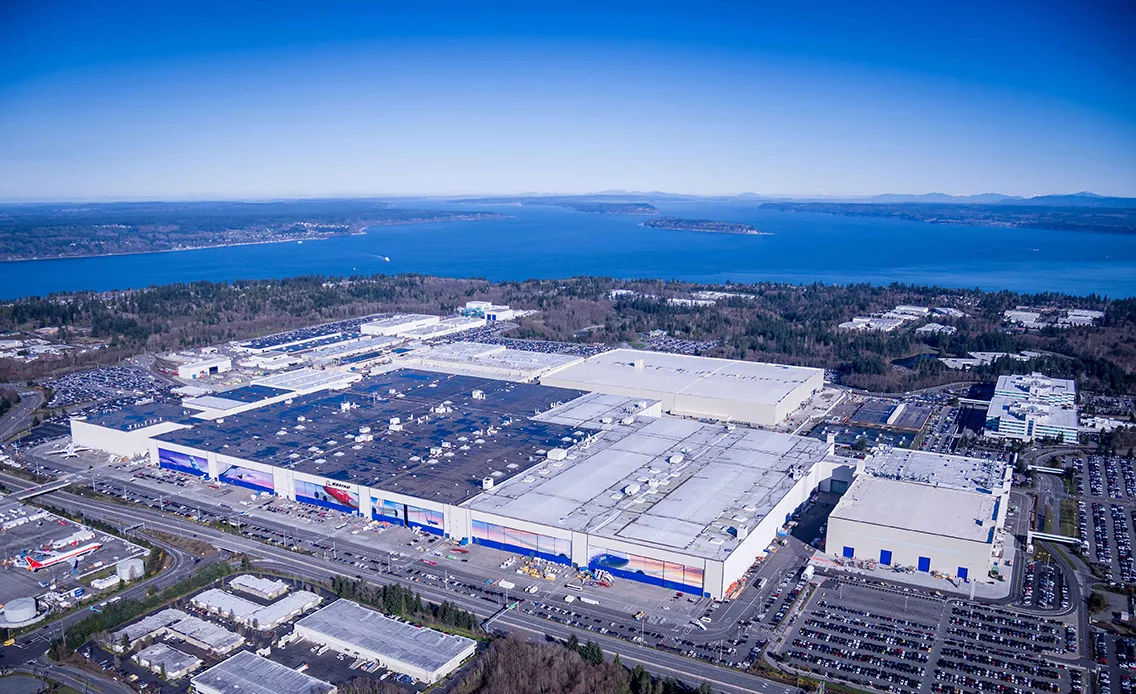
Boeing's giant factory complex just got a lot bigger
Aug 15, 2018

Boeing's expansive factory complex has recently undergone significant expansion, enhancing its production capabilities. This growth includes the addition of new facilities and state-of-the-art technology aimed at streamlining manufacturing processes. The larger complex allows Boeing to increase its output and meet rising demand for aircraft while maintaining high standards of quality and efficiency. With a focus on innovation and sustainability, the expanded site is expected to play a crucial role in the company's future projects, reinforcing Boeing's position as a leader in the aerospace industry. The development symbolizes the company's commitment to growth and technological advancement.
Boeing has recently expanded its already massive factory complex, an endeavor that underscores the company’s commitment to meeting the growing demand for commercial aircraft. This expansion not only enhances Boeing's production capabilities but also solidifies its position as a leader in the aerospace industry. In this article, we will delve into the details of this expansion, its implications for the aerospace market, and how it positions Boeing to compete effectively in the global arena.
The Scale of Boeing's Expansion
The newly added facilities at Boeing's factory complex cover an extensive area, significantly increasing the overall production footprint. The expansion includes state-of-the-art manufacturing facilities, advanced technological integrations, and enhanced efficiency metrics. This investment reflects Boeing's proactive approach to address the backlog of aircraft orders and meet future market demands.
Below is a table summarizing the key aspects of Boeing's factory expansion:
| Feature | Details |
|---|---|
| New Facility Size | 1.5 million square feet |
| Investment Cost | $1 billion |
| Production Increase | 30% more aircraft annually |
| New Jobs Created | 5,000 jobs |
Technological Innovations
As part of the expansion, Boeing is integrating cutting-edge technologies into its manufacturing processes. This includes the adoption of "robotics", "automation", and "AI-based systems" to streamline production and improve quality control. The use of advanced digital tools allows for real-time monitoring and adjustments, ensuring that the aircraft produced meet the highest safety standards and performance specifications.
Moreover, the incorporation of sustainable practices is a significant focus in this expansion. Boeing is committed to reducing its carbon footprint, and with the new facilities, it aims to implement "green technologies" that minimize waste and energy consumption. This commitment aligns with global trends toward sustainability in manufacturing.
Impact on the Aerospace Market
The expansion of Boeing's factory complex comes at a pivotal time for the aerospace industry. The post-pandemic recovery has led to a surge in demand for air travel, which in turn has intensified the need for new aircraft. Boeing’s ability to ramp up production is crucial for meeting this demand and maintaining its competitive edge against rivals such as Airbus.
The chart below illustrates the projected growth in aircraft deliveries over the next decade, highlighting the necessity for increased production capacity:
| Year | Projected Deliveries |
|---|---|
| 2024 | 750 |
| 2025 | 800 |
| 2026 | 850 |
| 2027 | 900 |
| 2028 | 950 |
Employment Opportunities
The expansion of Boeing’s factory complex is not only significant from a production standpoint but also from an employment perspective. The creation of "5,000 new jobs" will provide a substantial boost to the local economy and offer numerous opportunities for skilled workers in the aerospace sector. Boeing is focused on hiring a diverse workforce, aiming to bring in talent from various backgrounds to foster innovation and inclusivity.
With ongoing training programs and partnerships with local educational institutions, Boeing is poised to develop the next generation of aerospace professionals. This commitment to workforce development is critical as the industry continues to evolve and adapt to new technologies and market demands.
Conclusion
Boeing's recent expansion of its giant factory complex is a strategic move that positions the company for future growth in the competitive aerospace market. With enhanced production capabilities, cutting-edge technologies, and a focus on sustainability, Boeing is set to meet the increasing demand for aircraft while also contributing positively to the local economy. As the company continues to innovate and adapt, it reaffirms its status as a leader in the aerospace industry, ready to tackle the challenges and opportunities that lie ahead.
Related Articles

Explore Thailand: The Best Islands to Visit for Paradise, Adventure, and Relaxation

The Ultimate Guide to the Best Islands in Thailand for Your Next Getaway

Do babies need passports? How to get a passport for a newborn

How to get a U.S. passport fast: here’s how to expedite the process

What is Mobile Passport Control: 5 reasons why you should use it

SENTRI vs. Global Entry: A detailed guide

Do you need a passport to go to the Bahamas? Let’s find out

Do you need a passport to go to Mexico? A detailed guide

Do you need a passport to go to Canada? We got the answer

Do You Need a Passport for a Cruise: An Essential Travel Guide

Booster Seat Requirements: All the Rules to Follow in Your Rental Car

What Are the World’s Most Powerful Passports, and How Does Yours Rank?

How to Take a Passport Photo at Home: A Helpful Guide

You've got to have heart! Southwest's new livery

Your opinion: Should water be free on low cost carriers?

Young women bolder than guys as solo travellers
